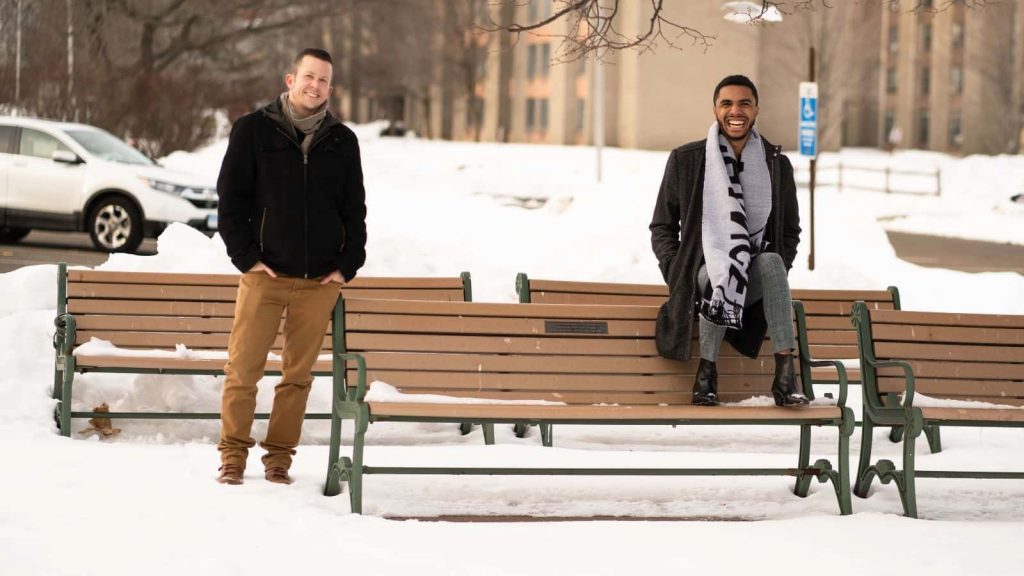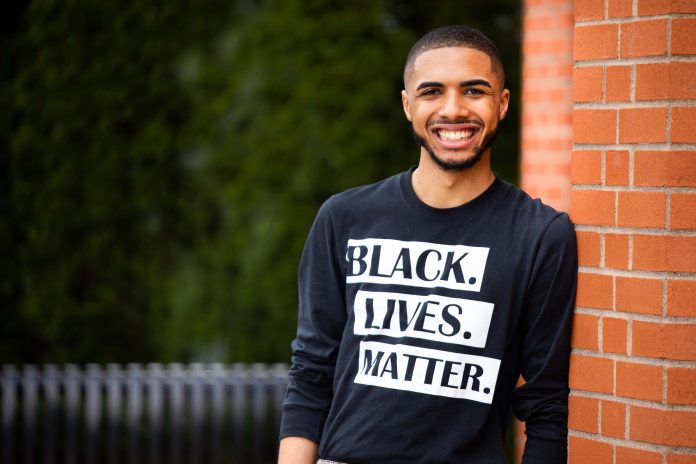Jamil Harp, who overcame adversity through education and opportunity, now leads by example with a focus on activism and change. As a first-generation student from Bridgeport, his journey has been an uphill climb, one of growth, travel and self-transformation: from academically struggling in inner-city schools to prospering as a member of a diverse campus community.
“A lot has changed,” said Harp. “Anyone that knows me knows that I have been deeply embedded in Southern’s culture. I’ve made Southern my home.”
A senior communications major at Southern, Harp will walk across the stage at Jess Dow Field this month during a series of in-person commencement exercises celebrating the Class of 2021. As a Black gay man four generations separated from slavery, Harp represents some of the best a university dedicated to the essentials of respect, kindness, and civility has to offer.
Harp comes from a lower income family and a traumatic background, raised by a single mother at a young age and abandoned by a drug-addicted father. As a result, he struggled in an overcrowded, poorly managed educational environment and began to skip classes entirely. “My mother always told me I was supposed to go to college, to do better than those around me,” said Harp. “I wasn’t really sure how I was going to go to college if I wasn’t even interested in going to my classes in high school at that time.”
The change began during his sophomore year of high school, where Harp began volunteering with buildOn, a nonprofit dedicated to taking students in under-resourced schools and allowing them to tackle Bridgeport’s most challenging issues such as homelessness and food insecurities. Working in these food pantries and homeless shelters, Harp saw the direct impact of societal challenges.
“It was a very different experience for me,” said Harp. “These were people that I knew from my community that I was helping pick out clothes. It almost helped heal me, so it felt like my community service was doing more for myself than it was for my community.”
That one afternoon of volunteering turned into every afternoon, where Harp would commit more than 500 hours of community service in Bridgeport. buildOn would allow him to travel to Africa during the summer of his sophomore year, where he spent three weeks building a primary school in Malawi. While staying with his host family, he even convinced the father of the household to allow the women in his family to attend school. “That’s one of the moments where I decided this work, for social justice but mainly education, was important.” said Harp. “The fact he was able to tell me yes, (they could attend school) and that I could use my privilege to leverage that, was groundbreaking.”

After he returned to Connecticut, Harp said things started to turn around, and his outlook on education changed. His social circles altered, grades turned from Ds to As and he was ready for the college experience, applying for hundreds of scholarships. He became the first to graduate from high school in his immediate family and chose Southern for its affordability and its Educational Opportunity Program (SEOP).
“My parents didn’t graduate from high school, my grandparents didn’t graduate from high school, and my older sibling didn’t graduate from high school,” said Harp. “For me, graduating high school was a very big accomplishment.”
SEOP is a five-week program for students who show promise for success but have faced educational or economic disadvantages that have impacted their preparedness for college. “Education tends to be generational within families. I wanted a support system to help me transition into college,” said Harp. “Because of my high school experiences, I felt I was extremely underprepared for college, academically.”
When he arrived at Southern in 2016, Harp said he felt unsure of his role at the university. Five years later, his résumé includes being an SEOP Peer Mentor, peer academic success coach and senior resident advisor.
“As someone who is first-gen, I didn’t really know what I was setting myself up for. Going to a school that was relatively cheap was just ideal for me,” said Harp.
As someone who fell on the low-income spectrum, Harp felt underprepared to enter any post-secondary institution due to educational barriers and challenges along the way. Paying for college with scholarships and work studies, Harp had to learn how to apply for financial aid, purchase books, and develop efficient study habits. “Many first-generation students don’t feel comfortable in this space,” said Harp. “Those feelings quickly receded because I needed an education.”
Harp began to move from someone who felt out of place to finding a place of belonging. He sought the help of professors and resources on campus in order to help him thrive. “I had to navigate through all these things, while also learning how to advocate for myself,” said Harp. “That’s how I really ended up in student leadership, by discovering the needs I needed, and then a community of peers who had the same needs.”
One of his latest leadership roles includes working as a student activism intern at Southern’s newest Division for Diversity, Equity and Inclusion (DEI). Marketing the university’s commitment to synergizing higher education and social justice, Harp has worked with university officials to develop a podcast, “Real Talk,” to address campus and societal concerns head-on through meaningful and crucial conversations.

Harp believes Southern is making progress but still has a ways to go toward becoming a social justice and anti-racist university, beginning with supporting marginalized students with varying identities, as well as those facing racial and social inequalities. “I watched Southern take a lot of important first steps into acknowledging issues that exist on campus and making meaningful strides towards accomplishing them,” said Harp. “As a marginalized student in all of my identities, I have been able to find people and spaces in which I feel comfortable and safe.”
KC Councilor, assistant professor in the Communications, Media and Screen Studies department, co-hosts “Real Talk” alongside Harp. As Councilor was a new faculty member, Harp was able to give him insight into the university community. “He has a way of being assertive, clear and demanding of justice, as well as welcoming and inviting at the same time,” said Councilor. And through their commitments to the LGBTQIA+ community, Harp and Councilor formed an instant connection.
“We have the unique role of being podcast hosts together,” said Councilor. “He has a way with people and a way with words. He’s so good at speaking, so good at knowing what’s happening, and able to talk about things on the dime. I couldn’t imagine co-hosting a podcast with anybody else.”
Harp said he will remember experiences from Southern that mean the most to him — serving as an RA, sitting on the patio outside Buley Library, mentoring underclassmen and having the support of his fellow students of color. “Having that fellow support of my peers that look like me has been extremely impactful,” said Harp.
Continuing his education, Harp hopes to pursue a master’s degree in higher education pertaining to diversity, equity, and inclusion or African American history. His goal is to help develop anti-racist and social justice policies that strive for inclusion of marginalized students such as himself.
“Jamil, more than any student I know, has made the most out of his time on campus,” said Councilor. “He has taken advantage of every opportunity that Southern offers in ways that I wish more students would.”
Harp hopes the legacy he leaves at Southern includes students having the ability to advocate for their needs and mentor each other on how to bring about change through activism.
“Students, never be quiet,” Harp said. “Speak up! I think some of them will.”


